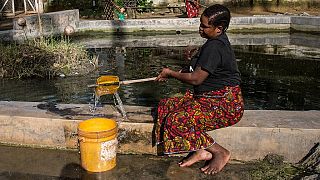Drought
Somalia is in the midst of the worst drought anyone there can remember.
More than 1.2 million people have been driven from their homes, according to the U.N.'s World Food Program (WFP).
A rare famine declaration could be made soon.
Climate change and fallout from the war in Ukraine are in part to blame.
Thousands of people have died, many of them children.
Baidoa in the south is among the worst-hit areas by the drought, with some of the highest malnutrition rates in the country, according to the WFP.
Famine is projected there between October and December, along with Burkhaba district, the WFP says.
Nuuriya and her toddler son Mohammed are currently residents at one of Baidoa's camps for internally displaced people (IDPs).
When they arrived in January, Mohammed was severely malnourished, but has since gained weight through treatment.
"When I left my home and came to Baidoa it was a long journey," Nuuriya says.
"We had to stop several times on the way – we walked all the way to Burkhaba and then we managed to get transportation to Baidoa."
Around 230km (140 miles) away, on the outskirts of Ladan IDP Camp in Dolow, Adan and Fartun Isaac visit the grave of their baby daughter who died shortly after their arrival, according to the WFP.
Fresh graves are ready nearby for displaced people who do not survive the journey from their homes.
The WFP says many families arriving at Dolow's camps have traveled from regions such as Bakool and Bay, among the worst affected by the drought.
Thousands of people have died in Somalia due to the drought, including nearly 900 children under 5 being treated for malnutrition, according to United Nations data. The U.N. says half a million such children are at risk of death.
The WFP is calling for more support.
"What kills in a famine is disease, is sickness, is poor hygiene because people who are hungry are weaker and more susceptible, so it has to be an integrated response," said Petroc Wilton, head of communications at WFP Somalia.
He continued: "Yes, food and nutrition, but also shelter, hygiene, safe water access, having all those things together, having the support from the world for all those things together is absolutely critical."











02:30
Morocco’s oases struggle to survive amid growing desertification
01:15
Morocco says 2024 was the hottest year with temperatures reaching 47.7 degrees
Go to video
South Sudan: UN warns of imminent famine
01:18
Gaza Crisis: Water shortages worsen
03:46
With 500 species, Moroccan exotic garden an oasis of biodiversity
03:52
Amid drought, King urges Moroccans not to kill sheep for Eid al-Adha